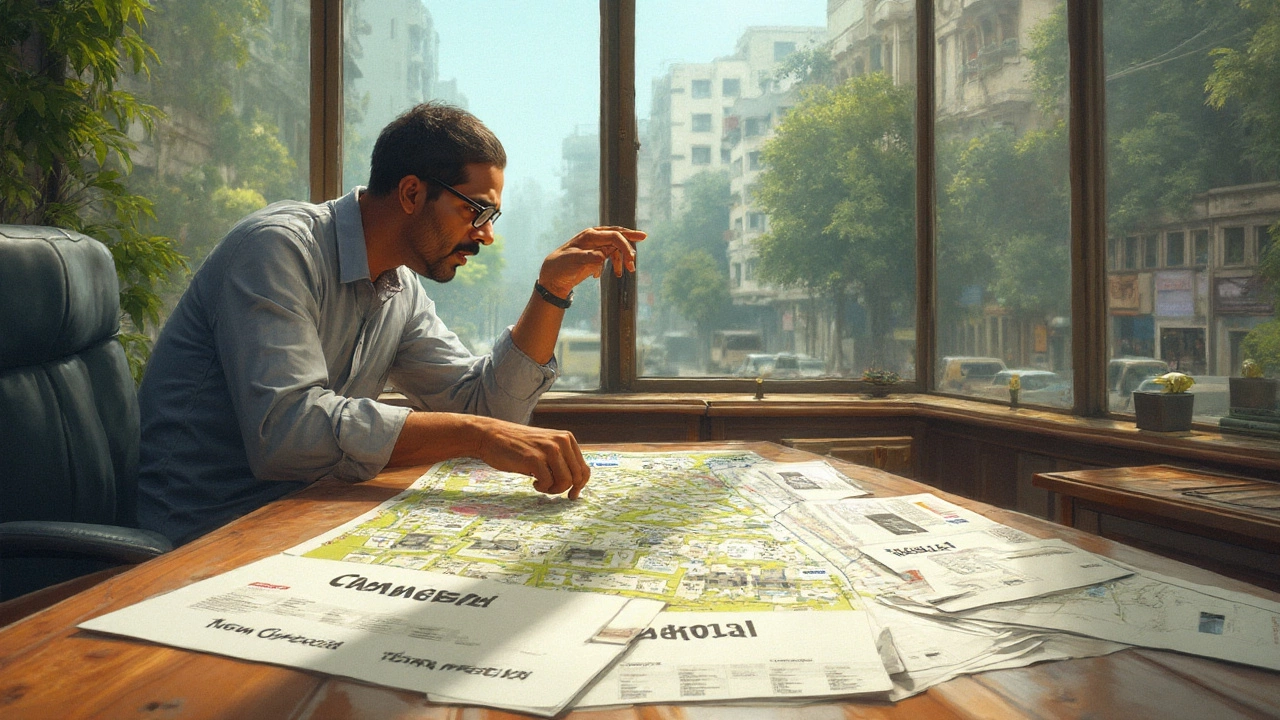Flip through news feeds or overhear conversations at the local café in Auckland, and you’ll catch plenty of talk about 'commercial' and 'non-commercial' stuff—real estate, licenses, building jobs, even the tall glass towers rising across the skyline. But if you push someone to define what really sets the two apart, you’re often met with vague shrugs or guesses. The funny thing is, these labels drive everything from what you pay in rates to how your neighborhood develops, and even who’s allowed to build what where. This topic isn’t just for lawyers or council planners; it trips up property owners, DIY-ers, business folks, and regular people trying to make sense of their rights (or what they can get away with in a backyard shed).
What Makes a Project Commercial?
If you ask someone what a commercial building is, you might hear 'That’s where businesses run'—which isn’t wrong, but there’s so much more. The term 'commercial' carries weight because it changes the rules you have to play by. Here in New Zealand, a commercial project usually means the primary goal is making money. So, we’re talking office blocks, hotels, shopping malls, restaurants, even a small local dairy. If a building or land use is set up for business activities aimed at turning a profit, you’ve found commercial territory.
Things get interesting with the details. Commercial construction jobs are regulated differently than homes. For example, the Building Code demands more robust fire safety, earthquake standards, and accessibility. Auckland Council inspections for commercial projects are stricter, and the documentation needed can triple in volume compared to residential builds. If you want to convert an old villa into a cafe, you’re suddenly juggling fire exits, ventilation, disabled toilets—the works.
Here’s one number to back this up: in 2023, Stats NZ reported over 1,400 new commercial consents in Auckland—each one facing tighter controls and higher costs compared to residential builds. If you’re renting out an apartment block purely for short stays or running it like a hotel, you enter commercial territory and rates can shoot up by several thousand dollars per year, based on Auckland Council rating schedules. It’s not just about what the building looks like—the definition links directly to business intention and community impact.
Another tidbit: Commercial projects often need resource consents for things like signage, noise, parking, waste, and food prep. A bar can’t just install speakers and party all night; there are noise restrictions for commercial venues that don’t apply to your average residential dinner party. Even insurance and banking work differently—banks treat commercial property as higher risk, so loans might need bigger deposits and charge higher interest rates. Insurance policies for commercial property often exclude things like natural disasters unless explicitly added.
To make it more relatable, think about school fundraisers. If your school holds a sausage sizzle and every dollar goes to new sports gear, that’s non-commercial. But if someone’s running a hot-dog van outside the rugby ground for profit, that slips into commercial. The money motive changes everything—the rules, the taxes, the safety checks, even liability for accidents on-site.
| Feature | Commercial | Non-Commercial |
|---|---|---|
| Typical Use | Business, retail, office, rental income | Private living, education, charity, hobby |
| Main Intention | Make profit | Personal or community benefit |
| Building Standards | Higher (fire, disabled access, parking) | Residential/hobby grade |
| Council Rates (Annual) | Higher, business rates apply | Lower, residential rates apply |
| Insurance Cost | Up to 30% higher on average | Standard residential rate |
So, if you’re thinking about renting your spare room full-time on Airbnb, check first—going commercial means different rules, and the fines for getting it wrong can sting.

How Non-Commercial Differs (And Why It Matters)
Let’s get real: Non-commercial isn’t just 'not for business,' it’s actually defined by intention and use. If what you’re doing is mainly for yourself, your family, or your community (and you’re not pocketing profits), it often qualifies as non-commercial. Most homes, charities, schools, and hobbyist clubs fall squarely under this label. But—here’s where people trip up—non-commercial doesn’t always mean 'zero money.' Some non-profits charge membership fees or take donations, and home gardeners might sell a few tomatoes. The difference is scale, frequency, and motive: as long as profit isn’t the main driver, you’re probably safe in the non-commercial zone.
So why does this split even exist? Well, the moment cash flows and business motives creep in, governments and councils worry about safety, taxes, and fair competition. A house hosting free yoga lessons for neighbors? No problem. Start charging drop-in rates, and you may need resource consent for business use. Take the classic Kiwi backyard bakery—if you bake a cake for your kid’s birthday, no one cares. But if orders start rolling in from Instagram, you might get a knock from compliance officers asking about food safety and licensing.
One common confusion: Charity work. A lot of charities run gift shops or fundraisers and still count as non-commercial, provided all proceeds go back into their cause, not into anyone’s pocket. Even then, some grey areas sneak in, especially with social enterprises—businesses that do good but also make some profit. Councils have been known to assess these on a case-by-case basis, looking at what percentage of revenue goes to charitable work versus into private hands. If you’re unsure, it pays to call the council for clarity.
Here are a few tips for anyone walking the blurry line:
- Check the Building Code. If you’re modifying your home for any business use—think hair salon, dog grooming, or even music lessons—look up the standards for commercial activities, especially fire and access requirements.
- Ask for advice. Auckland Council has helplines, but so do many insurance companies and trade groups. They know people slip up here all the time.
- Look at rates letters. If you notice a jump, you might be classified as commercial—and backdated charges can be massive if you ignored council notices.
- Don’t rely on what your mates say. 'She’ll be right' can land you in hot water if you start earning and the council disagrees with your interpretation of non-commercial use.
Different countries apply these definitions in unique ways. In the U.S., non-commercial use often means something else in licensing—like software that’s free for personal but not business use. In New Zealand, it’s about building standards and zoning. That’s why international chains like McDonald’s need full commercial consents to build in Auckland, while a school can host a market day with much less red tape.
Function matters too. Community centers, schools, religious halls—all usually qualify as non-commercial, unless parts are leased to businesses. Insurance adjusters look at usage history. If an old church converts into offices, the insurer will hike the premiums and apply stricter conditions. It’s all about risk and intended use.
Another fact worth knowing: According to Auckland Council’s 2024 annual report, over 200 properties were reclassified from residential to commercial due to enforcement audits, creating headaches for owners suddenly facing thousands in extra rates and compliance catch-up fees. Being proactive is way cheaper than cleaning up after a reclassification surprise.

Where the Lines Blur (And How to Navigate the Middle Ground)
So you might be wondering—what if your project isn’t black or white? Turns out, plenty of Aucklanders get caught out by the grey areas between commercial and non-commercial, and the council's approach is evolving as peoople find newer ways to use property. Think about home-based businesses, Airbnb hosts, side hustles, or a club renting their hall for a wedding. These sit right on the border, and how they’re treated depends on a cocktail of frequency, visibility, impact, and—yes—community complaints.
Take Airbnb hosting. If you occasionally rent a room while you’re away, that's often considered non-commercial or 'residential visitor accommodation.’ But start listing every weekend, hiring cleaners, and offering breakfast, and suddenly the activity looks like a commercial B&B. Auckland Council sets income and usage thresholds: renting out your entire home for more than 28 days a year can trigger commercial classification, which means higher rates and stricter fire/safety requirements. Not knowing these limits gets people in trouble all the time.
Or say you teach piano. If you have a couple of students a week, the council might let it slide as minor home use. A full roster, daily foot traffic, or advertising? Now you’re operating a business and need compliance checks. Even something as innocent as a gardening club can trip over the line—say, if plant sales become so popular that traffic or noise annoy neighbors. The law targets pattern and scale, not just intent.
There’s more. Some teenage entrepreneurs run Instagram shops from their bedrooms: if profits grow and pickup traffic increases, parents can end up on the hook for commercial zoning breaches. Neighbors have complained about backyard mechanics fixing up cars for cash, only to see the council step in and require expensive fire, waste, and noise measures.
Tips for staying out of trouble in the grey zone:
- Keep records. Track how often you sell, what you earn, and who visits. If the council comes knocking, clear records show intent and scale.
- Communicate early. Let neighbors know your plans—Auckland enforcement often acts on complaints first, not random audits.
- Use the council's 'pre-application' review. They’ll look at your project before you spend money, advising what rules or consents might apply.
- Don't ignore council letters—reply immediately, even if you think there’s a mistake. Penalties pile up fast when communications break down.
The biggest myth? That just because an activity is run from home, it’s automatically non-commercial. Auckland zoning maps and the Unitary Plan are public—you can check your property’s permitted uses online. Some areas allow minor home business with few restrictions, while others require written consent from neighbors for even side hustles. Don’t just go by the look of the building; councils focus on use, intent, and community impact above everything else.
Heads up: Tax authorities are also paying more attention. IRD data shared last year showed a surge in GST registration among small part-time landlords and hosts: the moment you cross commercial thresholds—even accidentally—you could be liable for business taxes and paperwork you hadn’t expected. The best policy: stay informed, ask questions, and when in doubt, treat border-zone activities as if they might be commercial. It’s safer for your wallet, and your peace of mind, too.
Nothing ruins the thrill of a new business or community project like surprise council action or insurance wrangles. The line between commercial and non-commercial isn’t always obvious, but understanding what defines each group gives you the power (and the savings) to do things right. Whether you’re starting an actual business, hosting yoga sessions, or just running the odd garage sale, these distinctions are the difference between a smooth run and a regulatory nightmare. Auckland might be built on concrete and glass, but the real foundations are these ground rules—knowing them puts you ahead of the game.




Write a comment